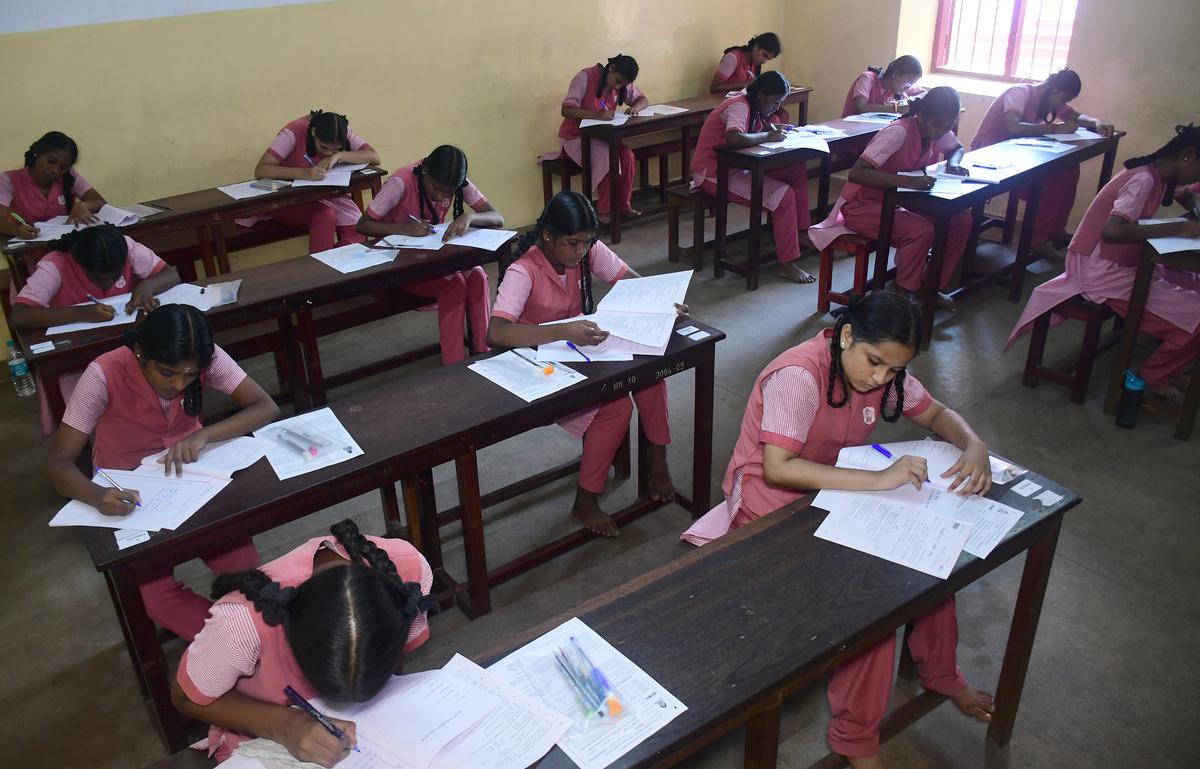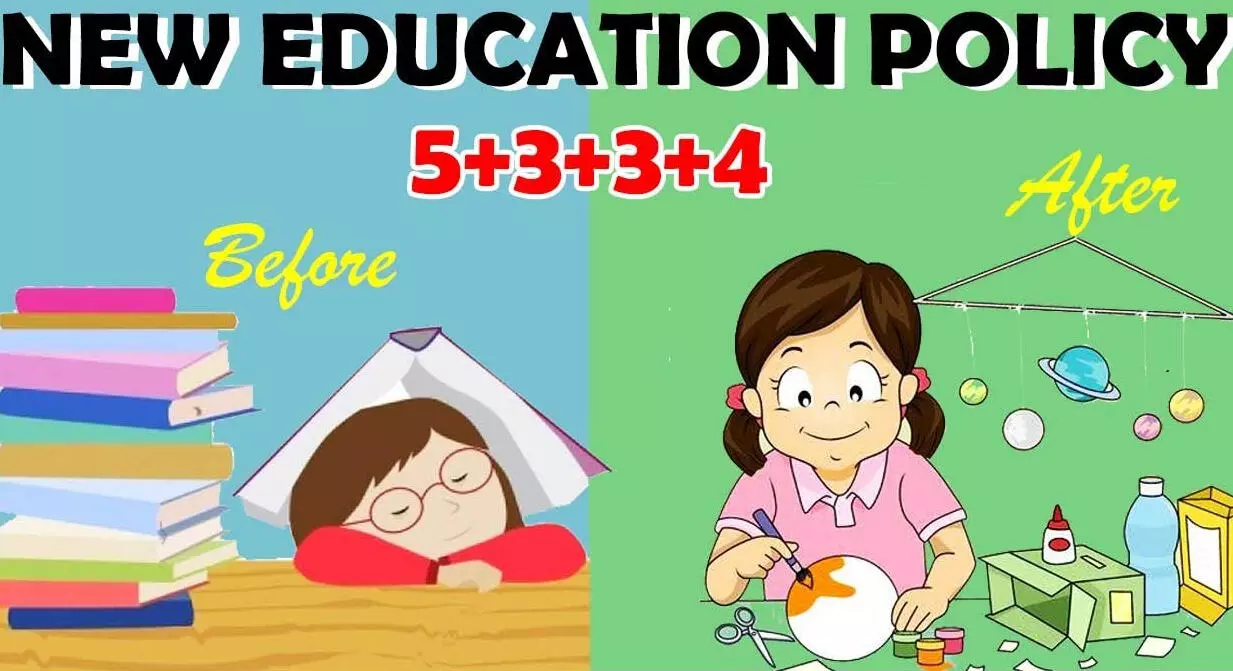Board Exams To Be Held Twice A Year, Student’s Best Scores Will Be Counted- Ministry of Education Adopts NEP-Aligned Curriculum for 2024
Ministry of Education unveils new curriculum framework aligned with NEP for comprehensive education reform pursuant to which board exams will be held twice a year.

Board Exams To Be Held Twice A Year, Student’s Best Scores Will Be Counted- Ministry of Education Adopts NEP-Aligned Curriculum for 2024
The Ministry of Education recently unveiled a ground-breaking curriculum framework that marks the beginning of a series of revolutionary changes, which includes the commencement of biannual board examinations as well as the flexibility that students have to retain their best scores. This is an inspiring step toward reforming the educational landscape. This framework, which is in line with the New Education Policy (NEP), reframes conventional educational paradigms in a way that encourages holistic learning and lessens the excessive pressure brought on by only one annual examination.
Twice a Year: A New Board Examination Paradigm Adopted
The Ministry of Education has announced a dramatic shift away from the traditional strategy of conducting a single high-stakes annual board examination – board examinations are now going to be held twice a year. This change intends to give students with a more fair as well as beneficial assessment environment, eliminating the severe pressure which builds up over the course of an academic year in preparation for a single exam.
The Ministry emphasizes that this modification will allow students to sit for board exams when they feel they have been sufficiently prepared. Fostering a deeper grasp of subjects, this new approach would decrease rote retention and prevent board exams from being a mere memory testing exercise. This dynamic approach has the potential to promote a genuine understanding of competences, resulting in a more in-depth and comprehensive evaluation of the abilities and knowledge of students.

Retaining Best Scores: Encouraging Student Academic Performance without Fear
The new curriculum framework providing the opportunity for students to keep their top grades serves as one of its most noteworthy characteristics. The aforementioned provision provides students the freedom to work hard without worrying about the results. Instead of the pressure that comes with an all-or-nothing yearly exam, students have been placed in a setting where they may concentrate on learning subjects thoroughly as well as improving their abilities, which enhances their ability to remember information.
It is believed that the Ministry’s decision to permit better score retention will increase students’ self-assurance as well as motivate them to learn more about their subjects in-depth as their burden to achieve perfection in one testing session lessens. This change is consistent with the NEP’s overarching objective of encouraging learning which goes beyond memorizing.
The number of opportunities for students to exhibit their knowledge will increase, allowing them to express themselves to the best of their abilities while diminishing the stress that frequently results from the overwhelming anxiousness of failure. The likelihood of serious mental health problems like anxiety and depression is likely to get decreased by reducing the degree of these high-stress events. These improvements are expected to have a positive impact on the regrettable cases of student suicides brought on by stressful educational environments.
Students will have the ability to grow from their mistakes, concentrate on strengthening their areas of weakness, as well as adopt a more positive outlook on their academic journey. We could look forward to an entire generation of students who have proved not only academically capable but are additionally mentally strong and prepared for the challenges of life given that these reforms take effect.
Flexibility in Subject Choices: Beyond Rigid Barriers Of Traditional Streams
The new curriculum structure also has a transformative impact on students’ academic preferences. Students will now have more freedom in picking which subjects they want to study than they previously did, when they were restricted to fields like the arts, sciences, and commerce. Students can now design multidisciplinary learning journeys which are in line with their interests and career goals as a result of the removal of the rigid barriers that previously existed between various academic routes.
The Ministry hopes to encourage students to engage in a variety of disciplines in the future, creating well-rounded learning experiences along with cultivating a wider perspective on academic pursuits as well as professional options.
Emphasis on Quality Education and Resource Optimization
The curricular framework emphasizes maximizing the effectiveness of educational resources in addition to assessment changes. It criticizes the prevalent practice of just “covering” textbooks in classrooms and highlights the significance of effective textbook utilization. Moreover, the Ministry’s commitment to lowering textbook costs guarantees that quality education is available to all students, regardless of their socio-economic status.

Union Education Minister Unveils New Curriculum Framework and Textbook Development Plans
Union Education Minister Dharmendra Pradhan announced the completion of the new curricular framework (NCF) in accordance with the National Education Policy 2020. He also mentioned that textbooks pertaining to the upcoming academic year 2024 have been put in the works. Minister Pradhan stated during the Joint Workshop of the National Curriculum Framework Oversight and the NSTC Committee that the school curriculum for the new National Education Policy had been thoroughly created under the leadership of Kasturirangan. He went on to say that the steering committee had been working hard on the curriculum and submitted its recommendations to the government for consideration.
Those recommendations were then forwarded to the National Council of Educational Research and Training (NCERT), which had formed two committees: the National Oversight Committee as well as the National Syllabus and Textbook Committee (NSTC). Minister Pradhan expressed the optimism that both of the aforementioned committees would develop educational programs customized to the needs of the twenty-first century with an emphasis on original Indian viewpoints.
Furthermore, he stated that they expected these committees to not only produce a progressive curriculum but to additionally develop forward-thinking resources for instruction and learning that were going to cover classes 3 to 12. On the same day, he added, the first orientation meeting for this purpose had taken place.
The recently introduced textbooks, according to Minister Pradhan, would successfully satisfy these ambitions given the international anticipation of India’s contributions as well as the vision proposed by the Prime Minister of Amrut Kal motivating the country. The Ministry of Education’s commitment to maximizing educational resources and creating high-quality teaching materials is seen in Minister Pradhan’s emphasis on the participation of committees like the National Oversight Committee and the National Syllabus and Textbook Committee. These committees are intended to create an educational experience which promotes a well-rounded and progressive form of learning for all students according to the needs of the contemporary world.
The new curriculum framework announced by the Ministry of Education marks a considerable shift from conventional educational approaches. The framework supports the NEP’s goal of comprehensive educational instruction based on competencies. The Minister’s speech brought out the collaborative efforts of government agencies, steering committees, as well as educational institutions, which are consistent with the Ministry of Education’s mission to provide comprehensive education. The government’s commitment to fostering holistic learners who are equipped to meet the challenges and opportunities of an evolving world is reflected in the emphasis on original Indian viewpoints, futuristic learning resources, in addition to a curriculum designed to meet the needs of the modern age.
Through the development of a school atmosphere that fosters curiosity, critical thinking, as well as a sincere love of learning, these improvements have the potential to completely transform the educational landscape. The Ministry envisions a future where students have the opportunity to participate in education more meaningfully, confident that their efforts will be recognized and celebrated, independent of the limitations of a single annual examination, as the new framework becomes up and running and learning institutions adapt to the new model of learning. The Ministry of Education’s transformational journey has the possibility of not only easing the rigors of an exam-centric educational system but also developing a generation of students ready to flourish in a constantly changing world.

Empowering Future Generations: A Transformative Step For The Education Sector
A major turning point in our country’s educational landscape has been reached with the introduction of the new curricular framework as well as the reforms that go along with it. The Ministry of Education has brought about an era of holistic learning that is customized to the needs of the 21st century with the systematic execution of biannual board examinations, the freedom to retain best grades, along with an enlarged array of subject choices. For the young generations to come, this historic change holds great promise for a more balanced, comprehensive, as well as progressive educational experience.
The approach recognizes the variety of learning styles and preferences by giving students the option to take board exams when they are most prepared. By releasing students from the constraints of mechanical repetition of information, this method fosters actual understanding and conceptual mastery. The choice to keep the top grades further frees students from the stress of taking a single annual exam, allowing them to concentrate on the real goals of education: exploration, critical analysis, as well as application.
As a result of the elimination of rigid subject and stream boundaries, students are now free to choose their own learning paths and follow multidisciplinary interests. This change is perfectly in line with the requirements of the employment landscape in India that is continually evolving, and in which adaptability as well as versatility are highly valued. The use of well-written textbooks as well as cutting-edge teaching materials strives to provide students with abilities that go beyond the classroom, cultivating their abilities as innovators, thinkers, and problem solvers.
These changes’ good impact extends beyond individual students. As a result of these shifts, the education industry is prepared for a transition that focuses on quality, accessibility, and inclusiveness. Students’ careers will be influenced positively when they enter the professional world equipped not only with textbook knowledge, but also with the capacity to think analytically, communicate effectively, and navigate complicated situations.
We could potentially look forward to a time when education is not merely a mechanical assembly line rather a dynamic journey that fosters development and self-discovery as the Ministry of Education’s innovative curricular framework gains traction. These adjustments establish a strong basis for students’ overall growth, enabling them to make important contributions to their communities as well as the larger world. Without a doubt, the effects of this transition will reverberate beyond generations, influencing the future leaders, innovators, and changemakers of India.




